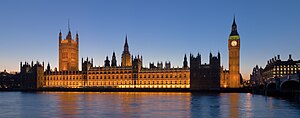Just looking at this week's
EKOS report. Obviously nothing shockingly new.
Obviously. Further Conservative drop, at 30.5 the only party above 30% and even at that,
barely. Current trends suggest in a week or two we might find that we have no single party polling above the twenties. And with all the present talk about mergers or coalitions in the air, it seems the reality of this deadlock is starting to sink in. Although it's nothing new, i was taken by the fact that EKOS, and most pollsters, put
five parties at above 10% or the vote. The current numbers, for reference:
- Conservatives: 30.5%
- Liberals: 26.3%
- NDP: 17.4%
- Green: 12.3%
- BQ: 10.5%
- Other: 3.0%
I got to wondering whether, among Canada's Westminster brethren, there was another example of such extreme dissipation of voter intent. If there was another place where the
fifth most popular party still polled above ten percent. I chose to look at the most recent parliamentary elections. Obviously our coalition chatter has a lot to do with the UK precedent. What were the top five parties there?
- Conservatives: 36.1%
- Labour: 29.0%
- Lib Dems: 23.0%
- UKIP: 3.1%
- BNP: 1.9%
1.9% is a long, long way from 10.5%. Australia?
- Labor: 43.4%
- Liberal: 36.3%
- Greens: 7.8%
- Nationals: 5.5%
- Family First: 2.0%
2.0% is actually high, because you might choose not to put the Nationals on this list, being a largely symbiotic party constantly allied with the Liberals (like the CSU in Bavaria). In that case, #5 is even lower: 0.8%. What about their neighbour New Zealand?
- National: 44.9%
- Labour: 34.0%
- Green: 6.7%
- ACT: 3.7%
- Maori: 2.4%
Higher than the UK and Australia, but still less than a quarter of the BQ's support. Ireland? Note these are 'first preference' votes.
- Fianna Fáil: 41.6%
- Fine Gael: 27.3%
- Labour: 10.1%
- Sinn Féin: 6.9%
- Green: 4.7%
That's way higher than what we've seen so far, but still very low. If the Jamaican general election Wikipedia page is to be believed, the 5th biggest party did not win a single vote in the whole country. Trinidad and Tobago doesn't even have five parties.
I made a point of looking at the South Asian Westminster democracies, since India, Pakistan and Bangladesh are famous for having loads of parties. And of course they do: but, like Israel and Italy, a large number of parties tends toward coalitions or 'alliances'. Somewhere along the way, Canada has become exceptional. It might well be true that Canada has the widest electoral divide among countries
that still resist formal coalitions. None of the talk buzzing around Parliament Hill regarding the opposition parties strikes me as reliable or meaningful, but it would appear that there
is a trend, particularly in Westminster systems, toward a smaller number of 'mainstream' electoral choices - be that through coalition or merger.
What that can mean for Canada, I can only speculate.
 Image via Wikipedia
Image via Wikipedia

No comments:
Post a Comment